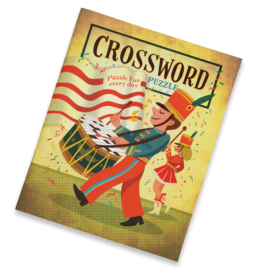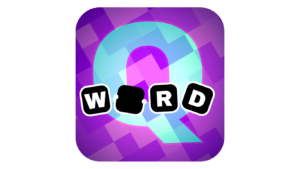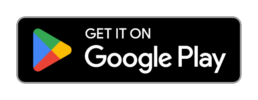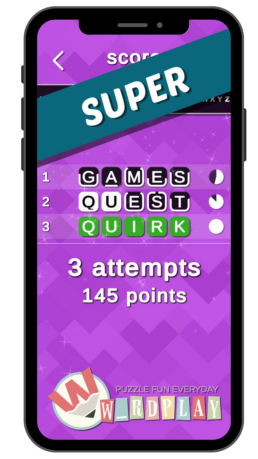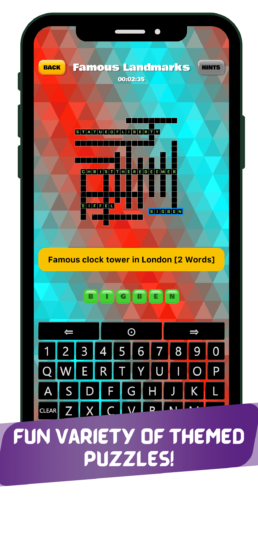Understanding
Crossword Puzzles
Everything You Need to Know About Your Favourite Pastime
Crossword puzzles are a beloved pastime that has been around for over 150 years. So, how is it that this simple puzzle has remained so popular with little to no changes to the rules or structure?
Your guess is as good as ours, but we’d put our money on the fact that they are simple, fun, inexpensive, and incredibly addictive. Let’s dive a bit deeper though.
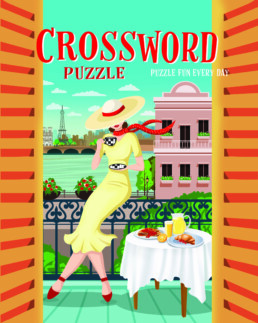
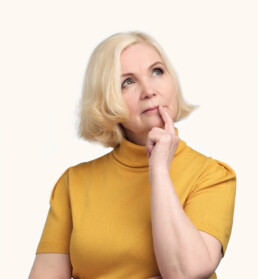
What Are Crossword Puzzles & Where do They Come From?
In the simplest of terms, a crossword is a word puzzle that uses lines of square blocks. Clues are provided, and the blocks are filled in with the letters that match the answers to these clues.
Crossword-like puzzles originated in England around 1873, but the first-ever modern crossword puzzle that we know and love today was invented in 1913 after being published by the newspaper, New York World. Back then it was known as a “word-cross” puzzle.
The “word-cross” puzzle was a huge hit and soon became a regular weekly feature in New York World, and eventually, was picked up by other newspapers at the time, such as the Pittsburgh Press and the Boston Globe.
By the 1920s, crosswords were all the rage, and in 1924, the first-ever crossword puzzle book was published by Simon & Schuster.
In 1942, the New York Times decided to capitalize on the trend to distract its readers from the harshness of WWII, and launched its now world-famous crossword puzzle. The rest, they say, is history.
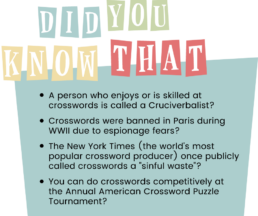
What Are Crossword Puzzles & Where do They Come From?
In the simplest of terms, a crossword is a word puzzle that uses lines of square blocks. Clues are provided, and the blocks are filled in with the letters that match the answers to these clues.
Crossword-like puzzles originated in England around 1873, but the first-ever modern crossword puzzle that we know and love today was invented in 1913 after being published by the newspaper, New York World. Back then it was known as a “word-cross” puzzle.
The “word-cross” puzzle was a huge hit and soon became a regular weekly feature in New York World, and eventually, was picked up by other newspapers at the time, such as the Pittsburgh Press and the Boston Globe.

By the 1920s, crosswords were all the rage, and in 1924, the first-ever crossword puzzle book was published by Simon & Schuster.
In 1942, the New York Times decided to capitalize on the trend to distract its readers from the harshness of WWII, and launched its now world-famous crossword puzzle. The rest, they say, is history.

Brain Health Benefits of Crosswords
Crossword puzzles offer numerous benefits when it comes to brain health. This includes:
Improved Memory
One study found that adults who completed crosswords regularly later in life experienced a slower decline in memory health compared to adults who did not do crossword puzzles.
In fact, the study also found that those who are already at risk for Alzheimer’s and Dementia experience better memory later in life by doing crossword puzzles.
Overall Better Brain Health
Another study that examined the impact of crossword puzzles on brain health found that those who enjoyed crosswords on a regular basis experienced higher levels of brain cognition.
In fact, the cognition levels of crossword enthusiasts were found to be similar to that of someone 10 years younger. So, it’s fair to say that crossword puzzles will help keep you young!
Improved Anxiety
For those who experience anxiety, stimulating exercises like crossword puzzles can be a great help. The idea is that crossword puzzles help those with anxiety redirect their nervous energy to a relaxing task that requires problem-solving.
Better Focus
It’s no secret that completing a tough crossword puzzle requires a lot of focus. For those who struggle with their ability to focus on certain tasks, having an enjoyable activity like crossword puzzles can help you practice your focus on a “fun” task and greatly improve your concentration.
What is the Secret to Solving Tough Crossword Puzzles?
Finding yourself stuck on a particularly tough crossword puzzle? Before you start to pull your hair out our break your pencil, check out some of our top tips for completing a difficult puzzle:
- Use a pencil – it’s ok to make mistakes!
- Focus on the smaller words first
- Consider the theme
- Complete the “fill in the blank” clues first – these are often the easiest
- Practice, practice, practice
- Take a break and come back with a clear head
- Clues with question marks aren’t always literal and often have hidden meanings – consider puns or a play on words

Why Wrdplay
Crosswords are Different
Looking for a crossword that will keep you on your toes for hours on end? You’ve come to the right place. Our puzzle books have enough puzzles to keep you busy all month, and are challenging enough to keep you on your toes without you wanting to rip your hair out.
All of our puzzle books have the following features:
- Over 60 puzzles per book
- Brand-new, never-before seen titles
- Quality, bright white paper
